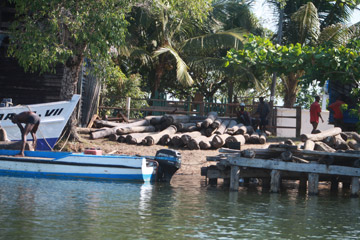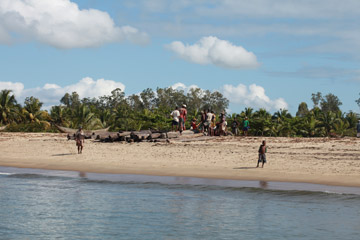A new decree by Madagascar’s transitional government may fuel continued destruction of the country’s tropical forests and biodiversity, warns a statement issued jointly by a dozen leading scientific and conservation groups.
The decree, issued by Andry Rajoelina, a politician who seized the presidency during a March military coup, allows the export of hardoods illegally harvested from Madagascar’s national parks during the political crisis. The timber, much of which was cut from Marojejy and Masoala national parks, was previously banned from export following international outcry over the destruction of protected areas as well as the accompanying commercial bushmeat poaching of endangered lemurs and other wildlife.
 Hardwood logs likely cut from Masoala National Park being loaded in Maroantsetra, Madagascar  Rosewood logs on a beach in Maroantsetra, Madagascar. |
While Rajoelina’s government previously decreed a ban on further harvesting of precious woods, the statement says the new decree “will allow their export and surely encourage a further wave of environmental pillaging.”
“Malagasy civil society, conservation and development organizations and the international
community are united in lamenting the issue of the most recent decree, in fearing its consequences and in questioning its legitimacy,” reads the statement. “Consumers of rosewood and ebony products are asked to check their origin, and boycott those made of Malagasy wood.”
A Global Witness report estimates that $35 million worth of rosewood was been cut per month since Madagascar’s political crisis escalated in January. Exploitation allegedly involves criminal gangs, government officials, and timber traders in France and China.
Madagascar’s forests and wildlife have been hard hit by the crisis. Beyond illegal exploitation and trafficking, political instability has dried up the country’s $390 million-a-year tourism business, much of which is based around ecotourism. Donors have also cut aid, seeking to avoid lending legitimacy to the unelected government.
Malagasy government’s decree for precious wood export will unleash further environmental pillaging
Recently Madagascar’s transitional government issued two contradictory decrees: first,
the exploitation of all precious woods was made illegal, but then a second allowed the
export of hundreds of shipping containers packed with this illegally harvested wood.
Madagascar’s forests have long suffered from the abusive exploitation of precious woods,
most particularly rosewoods and ebonies, but the country’s recent political problems have
resulted in a dramatic increase in their exploitation. This activity now represents a
serious threat to those who rely on the forest for goods and services and for the country’s
rich, unique and highly endangered flora and fauna.
Precious woods are being extracted from forests by roving and sometimes violent gangs
of lumbermen and sold to a few powerful businessmen for export. Madagascar has 47
species of rosewood and over 100 ebony species that occur nowhere else, and their
exploitation is pushing some to the brink of extinction. Those exploiting the trees are
also trapping endangered lemurs for food, and the forests themselves are being degraded
as trees are felled, processed and dragged to adjacent rivers or roads for transport to the
coast. No forest that contains precious woods is safe, and the country’s most prestigious
nature reserves and favoured tourist destinations, such as the Marojejy and Masoala
World Heritage Sites and the Mananara Biosphere Reserve, have been the focus of
intensive exploitation. Currently thousands of rosewood and ebony logs, none of them
legally exploited, are stored in Madagascar’s east coast ports, Vohémar, Antalaha, and
Toamasina. The most recent decree will allow their export and surely encourage a
further wave of environmental pillaging.
Malagasy civil society, conservation and development organizations and the international
community are united in lamenting the issue of the most recent decree, in fearing its
consequences and in questioning its legitimacy. Consumers of rosewood and ebony
products are asked to check their origin, and boycott those made of Malagasy wood.
Signed
CAS California Academy of Science
CI Conservation International
DWCT Durrell Wildlife Conservation Trust
EAZA European Association of Zoos and Aquaria
ICTE Institute for the Conservation of Tropical Environments
MBG Missouri Botanical Garden
MFG Madagascar Fauna Group
The Field Museum, Chicago
WASA World Association of Zoos and Aquariums
WCS Wildlife Conservation Society
WWF World Wide Fund for Nature
Zoo Zürich
Related articles
Innovative reforestation project threatened by ‘regime change’ in Madagascar, an interview with Rainer Dolch

(09/16/2009) In Madagascar the TAMS Program (Tetik’asa Mampody Savoka, meaning “the project to bring back the forest”) is under threat due to the new government’s unwillingness to provide funding. The current government, after gaining power in a coup this year, has frozen all funds slated for the project and has yet to sign a carbon credit agreement with the World Bank which would bring much needed funding. “It remains to be seen if the recognition or not of Madagascar’s transitional Government will lead to signing the contract with the World Bank in the near future. This is of course essential for the continuity of the project and its future,” Rainer Dolch told Monagaby.com in an interview.
Destruction worsens in Madagascar
(08/20/2009) Armed bands are decimating rainforest reserves in northeastern Madagascar, killing lemurs and intimidating conservation workers, despite widespread condemnation by international environmental groups.
Appalling photos reveal lemur carnage in Madagascar [warning: graphic images]

(08/20/2009) New pictures released by Conservation International depict a troubling development in Madagascar: the emergence of a commercial bushmeat market for lemurs. In the aftermath of a March coup that saw Madagascar’s president replaced at gunpoint by the capital city’s mayor, Madagascar’s reserves — especially in the northern part of the country — were ravaged by illegal loggers. Armed bands, financed by foreign timber traders, went into Marojejy and Masoala national parks, harvesting valuable hardwoods including rosewood and ebonies. Without support from the central government — or international agencies that pulled aid following the coup — there was no one to stop the carnage. But now it emerges that timber wasn’t the only target.